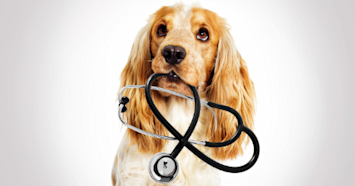
Do dogs have specific blood types like people? If you guessed yes, you are correct!
There are more than twelve different identified canine blood groups. These groups are described by the letters DEA (dog erythrocyte antigen) followed by a number. There are eight major DEA blood groups, labeled as DEA 1 to 8.
What is a blood group?
A blood group is classified by the presence or absence of a particular antigen (sugars and proteins) on the surface of a red blood cell (RBC). The presence of an antigen (positive) or a missing antigen (negative) on a RBC determines if blood will react with the antibodies in the plasma of another dog. Each DEA group is inherited independently, meaning a dog can have any combination of the 12+ blood groups. These genetic variabilities can lead to blood transfusion complications between the recipient and the donor. Just like in people, when a dog needs a blood transfusion, ideally a unit of the same blood type should be given to minimize risks.
Why does my dog need a blood transfusion?
If a dog does not have enough red blood cells (anemia), a blood transfusion may be warranted. A dog will need a blood transfusion when his/her blood volume gets critically low over time (such as parasites) or if there is an instant drop in blood volume (such as severe trauma).
What are the risks of a blood transfusion?
A blood transfusion reaction is an adverse event caused by the incompatibility of a blood product between a recipient and a donor. Signs of a reaction can vary from mild to life threatening. Fever is the most common sign of a reaction, but vomiting, diarrhea, trouble breathing, shock, tremors, seizures, and cardiopulmonary arrest may occur. Most complications occur rather quickly and are caught during in-clinic monitoring, but may occur 4-14 days later.
How can these risks be reduced?
Cross matching and/or blood typing prior to a blood transfusion can minimize the risks of adverse reactions. Cross matching involves examining the recipient antibodies in the serum to the donor RBC antigens and vice versa. Blood typing can determine the common DEA blood groups of a recipient, a blood product, and the donor to determine compatibility. Commercial blood-typing kits are available for blood donor screening.
What if there is not time for blood typing prior to a transfusion?
Whenever possible, transfusions should be performed between typed and crossmatched individuals. "Universal" donors and crossmatching should be utilized when blood-typing of the recipient is not feasible. Normally, a dog does not have antibodies against their own RBC antigens. Simply put, this means it is extremely rare for a dog to have a reaction with a first blood transfusion even if they are different blood types.
What if my dog needs another transfusion later in life?
Antibody formation in a recipient occurs after immune stimulation from exposure to another dog’s blood. It is these newly formed antibodies which can lead to an adverse future transfusion reaction if a recipient receives an incompatible donor DEA blood group. All second and subsequent transfusions must have cross matching and blood typing performed to minimize the risk of reactions. Therefore, DEA 1 negative dogs may only receive DEA 1 negative blood, whereas DEA 1 positive dogs may receive both DEA 1 positive (ideal) and DEA 1 negative blood.
Wait, are there dog blood donors?
Yes! Ideally, all canine blood donors should be blood typed and confirmed as a universal blood donor. Universal donors are negative for multiple of the DEA blood groups. Veterinarians typically have access to pre-screened blood donor dogs. If a clinic has a donor whom is not a DEA blood match, quality canine blood products can be purchased from commercial canine blood banks or local veterinary schools. Some large communities also have blood donor programs. The American Association of Blood Banking has set guidelines to increase the safety of blood products. To minimize risk of blood infections, donors should be screened for certain diseases, such as heartworm disease, as well as tick and blood-born illnesses.